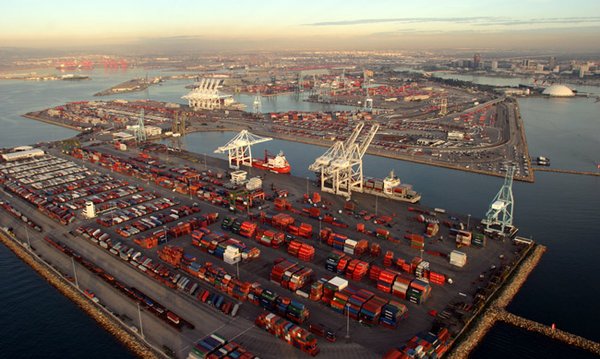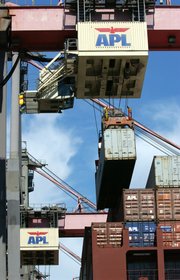IMPORT/EXPORT
Contract Negotiations on the Waterfront Worry Many About Shipping Season
Ship early and ship often. That’s the advice logistics experts are giving to apparel and textile importers who don’t want to be caught up in a possible strike that could take place this summer at West Coast ports.
Negotiations between the International Longshore and Warehouse Union, which represents 13,600 registered workers at West Coast ports, and the Pacific Maritime Association, whose 72 members include shipping lines and terminal operators, rev up on May 12 in San Francisco.
The current six-year contract expires on July 1, but few believe the negotiations will be wrapped up by June 30. In the past, it has taken weeks after the deadline to come up with an agreement, and this always puts importers and exporters on edge.
Major retailers and apparel manufacturers already have their contingency plans in place in case the talks hit a wall. Many are still rattled by the contentious contract negotiations that ended last year between East Coast dockworkers and their employers after several strike threats.
“All our members have been preparing their contingency plans for a while because they all knew this is coming,” said Jonathan Gold, vice president of supply chain and customs policy at the National Retail Federation, whose members are some of the largest apparel manufacturers and retailers in the United States. “You probably won’t see the contingency plans hit until the negotiations start.”
Those plans include routing merchandise to other ports on the East Coast, Gulf Coast, Canada or Mexico, or shipping early. The third and most costly option is air freighting goods, but this costs 10 times more than shipping by sea and is usually a last-ditch effort.
In Los Angeles, many customs brokers and logistics experts have advised their apparel customers to get their goods in before July 1 to make sure they have their merchandise in time for the critical Back-to-School and Holiday seasons.
“We’ve told our clients to build up their inventory by June 30, so if there is any problem in July, they won’t suffer. But they don’t have much time left,” said Enrico Salvo, chairman of Carmichael International Service, whose clients are mostly apparel companies.
Shipping early is considered cheaper than rerouting cargo to other ports.
On the table
In the past, contract negotiations have been stuck on issues such as automation and technology.
This time, the issues will be centered around a generous healthcare plan provided by the employers. Currently, longshore workers pay nothing for their healthcare coverage and only $1 for prescriptions even though they are among some of the highest-paid blue-collar workers in the United States.
Under President Obama’s Affordable Care Act, these generous healthcare plans will be subject to a “Cadillac tax” that will cost employers millions. The rationale for the tax is to rein in bloated healthcare plans that raise medical costs and to help fund Obamacare.
This “Cadillac tax” calls for a 40 percent excise tax on employer-sponsored plans spending more than $10,200 per employee or $27,500 per family.
Starting in 2018, PMA members will have to pay a hefty $150 million tax on the healthcare plans provided to longshore workers. “That will be a key part of the negotiations,” confirmed Wade Gates, a spokesperson for the PMA, based in San Francisco.
Because the tax doesn’t begin until 2018, it is possible the two sides could end up hammering out a three-year contract rather than a six-year contract to push the issue down the road.
Shipping lines and terminal operators are still having a tough financial time because vessel traffic is down from what it was before the Great Recession started in 2008. “The terminal operators up and down the coast are very concerned about this,” said Bruce Carlton, president and chief executive of the National Industrial Transportation League. “That $150 million is a huge hit.”
The ILWU, also headquartered in San Francisco, is worried about job security. While technology and automation issues were mostly resolved during the 2008 negotiations, there have been recent turf fights between different unions over job jurisdiction.
Last year, the ILWU tussled with the International Brotherhood of Electrical Workers over who had the right to plug, unplug and monitor refrigerated containers, known as reefers, at the port-container terminal in Portland, Ore. The electrical workers had been doing that job for decades.
The issue was decided by then Oregon Gov. John
Kitzhaber, who awarded the task to the ILWU.
The labor scuffle underscores the fact that union jobs are dwindling. That is due to automation, technology and because West Coast ports have been losing cargo-container volume to ports in Canada, Mexico and the East Coast of the United States. In 2008, the 29 West Coast ports’ share of containerized imports was 48.6 percent of the U.S. total. By 2013, that had fallen to 43.5 percent.
PMA members are also likely to push for dockworkers to contribute more to their pension funds because the workers are well paid. In 2012, the average annual salary for general longshoremen working 2,000 or more hours was $132,046. Marine clerks averaged $149,800.
Past negotiations
Every contract-negotiation season has its difficulties. In 2008, negotiations got contentious over automation and job security, but an agreement was reached a month after the contract expired. “No one expects a contract to be signed, sealed and approved on July 1,” said the National Industrial Transportation League’s Carlton. “But people are on edge.”
Many still are haunted by the disastrous contract negotiations in 2002. The PMA’s shipping companies and terminal operators locked out dockworkers on Sept. 27, shutting down all West Coast port operations for 11 days right during the important season to bring in holiday goods. Major apparel companies in Los Angeles lost millions when they were unable to deliver their goods on time and had to pay charge-back money or saw orders canceled.
President George W. Bush invoked the Taft-Hartley Act and got a court order to open up the ports again. It was the first work stoppage at the West Coast ports since 1971, when a strike closed the ports for several months.
Salvo, at Carmichael International, recalls that 1971 strike.”I have been working at this port for 60 years, and I remember the strike well,” the octogenarian said. “It lasted 93 days.”























